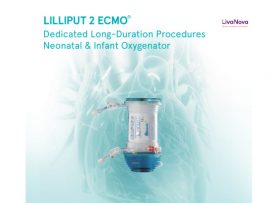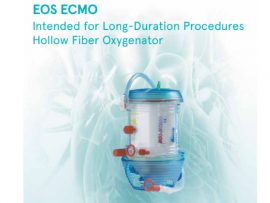Abstract Aim Minimizing cardiac arrest times is critical in extracorporeal cardiopulmonary resuscitation (ECPR). Pre-primed extra corporeal membrane oxygenator (ECMO) is used for this, but knowledge is limited to experimental studies...
Lire la suiteAbstract With a global increase in the demand for organ transplants, the organ shortage crisis has taken a turn for the worse, as the supply of available organs remains insufficient..
Lire la suiteAbstract Background St. Thomas cardioplegia is commonly administered to adults, yet repeated dosing at brief intervals is required. Del Nido’s cardioplegic solution provides a prolonged duration of safe myocardial arrest,..
Lire la suiteAbstract Venoarterial extracorporeal membrane oxygenation (VA-ECMO) has been increasingly used to treat refractory cardiogenic shock (CS) or cardiac arrest (CA) over the past decades. Peripheral VA-ECMO increases left ventricular (LV)..
Lire la suiteAbstract Extracorporeal membrane oxygenation (ECMO) is a cardiac or pulmonary function support system that is used in cases of refractory organ failure in addition to conventional treatment. Currently, Level I..
Lire la suiteAbstract Background Out-of-hospital cardiac arrest (OHCA) remains a significant cause of mortality and morbidity worldwide. Extracorporeal cardiopulmonary resuscitation (ECPR) is a potential intervention for OHCA, but its effectiveness compared to..
Lire la suiteAbstract Sparse data exist on sex-related differences in extracorporeal cardiopulmonary resuscitation (ECPR) for refractory cardiac arrest (rCA). We explored the role of sex on the utilization and outcomes of ECPR..
Lire la suiteAbstract Aim Venoarterial extracorporeal membrane oxygenation (VA-ECMO) has become a common intervention for patients with cardiogenic shock (CS), often complicated by cardiac arrest (CA). Moderate hypothermia (MH) has shown promise..
Lire la suiteAbstract Introduction Evidence suggests that Extracorporeal Cardiopulmonary Resuscitation (ECPR) can improve survival rates for nontraumatic out-of-hospital cardiac arrest (OHCA). However, when ECPR is indicated over 50% of potential candidates are..
Lire la suiteAbstract Nowadays, the necessity of having a cardioplegia circuit capable of being adapted in order to administer different types of cardioplegia is strategically fundamental, both for the perfusionist and for..
Lire la suiteAbstract Venoarterial extracorporeal membrane oxygenation (VA ECMO) has become a standard of care for severe cardiogenic shock, refractory cardiac arrest and related impending multiorgan failure. The widespread clinical use of..
Lire la suiteAbstract In donation after circulatory death (DCD) organ transplantation, normothermic regional perfusion (NRP) restores oxygenated blood flow following cardiac arrest and reverses warm ischemia. Recently, NRP has also been used..
Lire la suiteAbstract We read with great interest the article by Zhang and colleagues : a single-center experience showing that although 48.8% of all extracorporeal membrane oxygenation (ECMO) patients are successfully decannulated..
Lire la suiteAbstract Veno-arterial extracorporeal membrane oxygenation (VA-ECMO) is a powerful hemodynamic support strategy for patients with cardiogenic shock and out-of-hospital cardiac arrest (OHCA). Given that significant proportions of patients presenting with..
Lire la suiteAbstract Background Surgical pulmonary artery thrombectomy is a well-established emergency treatment for massive pulmonary embolism (PE) in which fibrinolysis or thrombolysis are not effective. However, surgery for massive PE that..
Lire la suiteAbstract Extracorporeal Cardiopulmonary Resuscitation (ECPR) is an emerging approach to cardiac arrest. We present two contrasting cases from a high-volume extracorporeal membrane oxygenation (ECMO) center (defined as greater than 30..
Lire la suiteAbstract Objectives Recent research suggests that increased cerebral oxygen use during surgical intervention for neonates with congenital heart disease may play a role in the development of postoperative white matter..
Lire la suiteAbstract THROMBOTIC MICROANGIOPATHIES (TMAs) are characterized by intravascular platelet activation, hemolysis, and microvascular thrombosis, causing multiorgan dysfunction. Precipitants include genetic predispositions, acquired immune dysregulation, infection, trauma, medications, organ transplantation, and..
Lire la suiteAbstract The use of extracorporeal membrane oxygenation (ECMO) to support patients with cardiac arrest, cardiogenic shock, and acute respiratory distress syndrome is rising worldwide.1 While ECMO may save the lives of..
Lire la suiteAbstract Aim Extracorporeal cardiopulmonary resuscitation (ECPR) can be considered in selected patients with refractory cardiac arrest. Given the risk of patient futility and high resource utilisation, identifying ECPR candidates, who..
Lire la suiteAbstract Background Intraoperative pulmonary embolism (PE) with cardiac arrest (CA) represents a critical and potentially fatal condition. Available treatments include systemic thrombolysis, catheter-based thrombus fragmentation or aspiration, and surgical embolectomy...
Lire la suiteAbstract Background The present article describes three cases of patients in cardiogenic shock (CS) with previous cardiac surgery that made them initially inoperable. Perioperative support with veno-arterial extracorporeal membrane oxygenation..
Lire la suiteAbstract Objectives To compare the incidences of postoperative thrombotic complications, transfusion of blood products, and chest tube output in congenital cardiac surgical patients who received either recombinant activated factor VII..
Lire la suiteAbstract Background Extracorporeal cardiopulmonary resuscitation (ECPR) may reduce mortality and improve neurological outcomes in patients with cardiac arrest. We updated our existing meta-analysis and trial sequential analysis to further evaluate..
Lire la suiteAbstract Five times of cardiac reoperations for PVE are a complex operation with significant risk. Due to the difficulty of aortic cross-clamping, mitral valve replacement (MVR) is performed under beating..
Lire la suiteAbstract Background Selective aortic arch perfusion (SAAP) is a novel endovascular technique that combines thoracic aortic occlusion with extracorporeal perfusion of the brain and heart. SAAP may have a role..
Lire la suiteAbstract Objectives The literature supports the assertion that patients undergoing cardiac surgery who receive perioperative packed red blood cell (pRBC) transfusions have increased associated mortality. The aim of the current..
Lire la suiteAbstract Background Out-of-hospital cardiac arrest (OHCA) remains a frequent medical emergency with low survival rates even after a return of spontaneous circulation (ROSC). Growing evidence supports formation of dedicated teams..
Lire la suiteAbstract National trends show rapid increases in the use of mechanical circulatory support devices (MCSD) over the last 20 years. While current literature has not proven a mortality benefit in..
Lire la suiteAbstract Left ventricular (LV) unloading has been shown to improve survival for patients requiring veno-arterial extracorporeal membrane oxygenation (VA ECMO) support for cardiogenic shock. A mortality benefit has been shown..
Lire la suite















